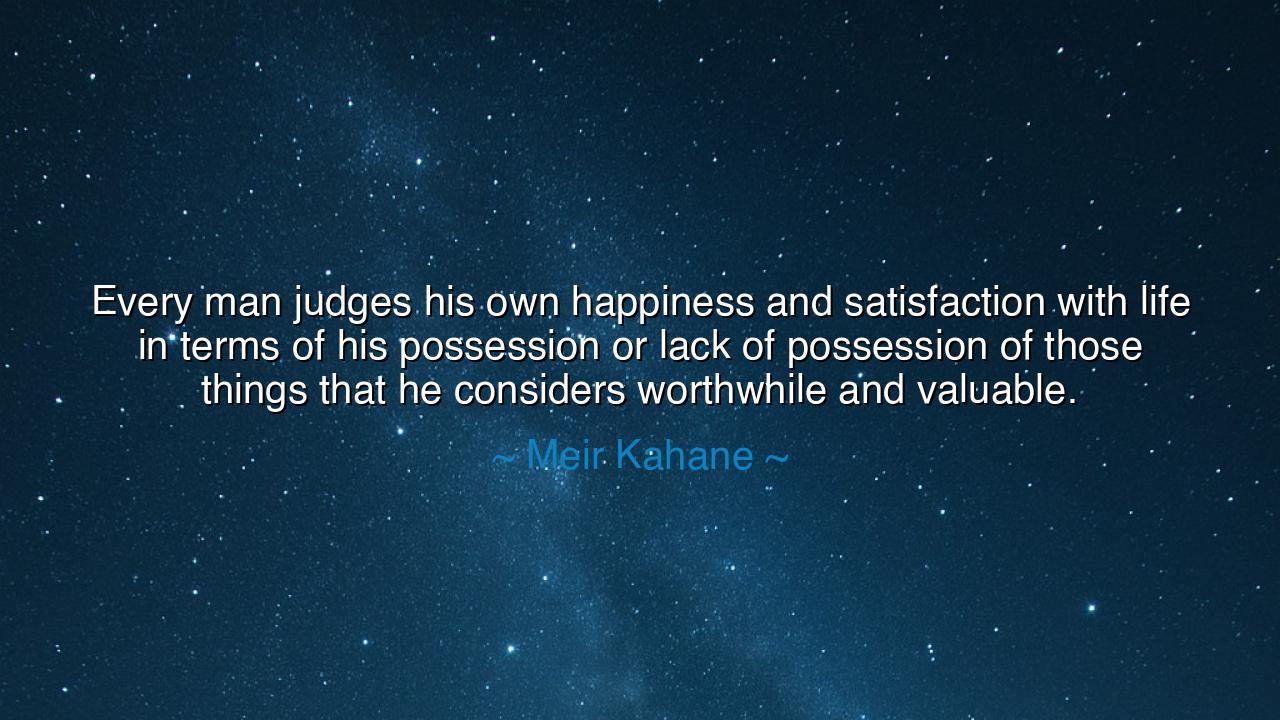
Every man judges his own happiness and satisfaction with life in
Every man judges his own happiness and satisfaction with life in terms of his possession or lack of possession of those things that he considers worthwhile and valuable.






In the voice of conviction and philosophy, Meir Kahane once said: “Every man judges his own happiness and satisfaction with life in terms of his possession or lack of possession of those things that he considers worthwhile and valuable.” These words, though uttered in the modern age, echo with the resonance of ancient truth — for they reveal the eternal law of perception: that no man’s joy or despair springs from the world itself, but from what he chooses to call valuable. Happiness, then, is not bestowed by fate nor stolen by circumstance; it is built within the mind’s temple, defined by the heart’s own measure of worth.
To the ancients, this teaching would have been familiar. The Stoic philosopher Epictetus taught that men suffer not because of things themselves, but because of their opinions about those things. Two men may stand beneath the same sun — one seeing glory, the other seeing burden — and yet their worlds are entirely different. Kahane, like the Stoics before him, recognized that each soul fashions its own universe. What one treasures becomes his master; what one despises becomes his chain. And thus, every man’s happiness or misery arises not from the abundance or scarcity of possessions, but from the value he places upon them.
When Kahane speaks of possession, he speaks not only of material wealth, but of all the things the human spirit clings to — power, recognition, love, freedom, faith, and belonging. Some find joy in riches, others in wisdom, others still in faith or family. But the truth he unveils is that each man’s contentment depends upon the harmony between his desires and his reality. If a man values what he cannot attain, he is doomed to unrest. Yet if he cherishes what lies within his reach — honor, virtue, truth — then even in poverty he may live as a king.
Consider the life of Diogenes of Sinope, the philosopher who lived in a barrel. When Alexander the Great came to see him, the conqueror asked if there was any favor he could grant. Diogenes, unbothered and free, replied, “Yes, stand out of my sunlight.” He owned nothing, yet wanted for nothing. To him, possessions were chains, and contentment was freedom. Alexander, who ruled the world, admired the man who needed nothing from it. In that meeting, two kinds of values faced each other: the conqueror’s ambition and the sage’s simplicity. Each man was satisfied according to his vision of what was worthwhile.
Meir Kahane’s words also carry a warning. For if happiness depends on what we deem valuable, then we must guard with great care what we allow ourselves to value. In an age that worships wealth and applause, men measure themselves by false idols and find their hearts empty. They chase shadows, mistaking possession for purpose. The wise, however, measure their worth by inner strength, by kindness, by service, by truth. These treasures cannot be stolen nor lost; they grow richer with time and adversity. Therefore, to seek happiness, one must first examine his soul and ask: “What do I truly hold sacred?”
The origin of all dissatisfaction lies in misjudged value — when the heart clings to what fades and forgets what endures. The man who treasures gold will tremble at loss, but the man who treasures virtue will be unshaken. The farmer who prizes his land for its harvest may despair when the field lies barren, yet the one who finds beauty in the labor itself will still sing as he tills the soil. So it is in all of life — the object of desire shapes the measure of joy. To be happy, then, is not to have all things, but to love the right things deeply.
Let this be the teaching for all generations: guard the gates of your heart. Choose your values as carefully as a jeweler selects gems, for they will determine the light by which you see the world. Ask not how much you have, but whether what you have is worthwhile. Seek to value truth over comfort, compassion over pride, purpose over pleasure. For those who possess such treasures can never be truly poor, and those who lose them can never be truly rich.
Thus, the teaching concludes: happiness is not the gift of fortune, but the judgment of the soul. Meir Kahane’s words remind us that every man carries within him the scales of his own contentment. The world offers both wealth and want, glory and shame — but it is the heart that decides their meaning. Therefore, strive not to own more, but to value better. For the man who treasures the eternal over the fleeting, who sees worth in wisdom and joy in simplicity, shall live at peace with the world and die content within himself.






AAdministratorAdministrator
Welcome, honored guests. Please leave a comment, we will respond soon